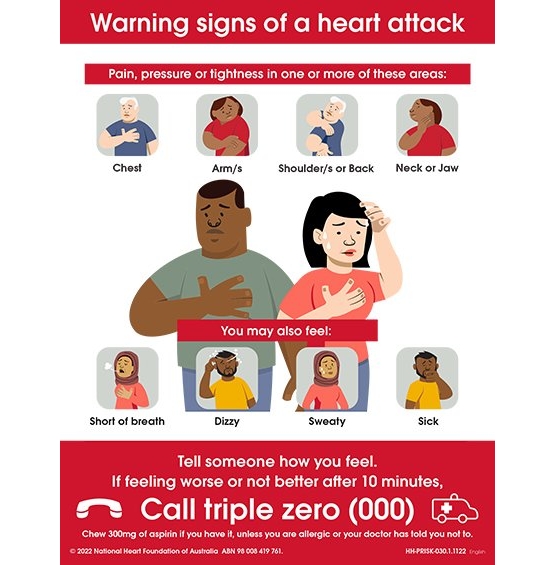
Heart attack warning signs
Free heart attack warning signs education, action plans and videos
Key takeaways
4 min read
- A heart attack is a medical emergency. If you, or someone you know, are experiencing the warning signs of a heart attack, call Triple Zero (000) immediately and ask for an ambulance.
- One in five people don't know the warning signs of a heart attack, which means many may not call Triple Zero on time.1
- With someone hospitalised for a heart attack in Australia every 9 minutes, everyone needs to know the warning signs and what to do.2
- There are free education resources, videos and action plans to help you recognise and respond to a heart attack.
There are too many people who don't know the warning signs of a heart attack and who are not calling an ambulance when they should. When having a heart attack, every minutes counts. The longer you wait, the more your heart muscle is damaged.
Knowing the warning signs and acting quickly could save your life, or the life of someone close to you. That's why we have a range of free resources available for you, your friends, family, workplace or community group.
Every minute counts, know the warning signs
If you don't know all the warning signs of a heart attack, you're not alone. Many people don't recognise they are having a heart attack or know what to do.
Common warning signs include chest pain, arm or shoulder pain, and shortness of breath. But some people feel sick, sweaty, dizzy, or have pain in their back, neck or jaw. These lesser-known symptoms are particularly common in women.
Watch our videos and download our heart attack warning signs action plan below to learn more. It could save your life.
Heart attack - do you know the signs? (English)
Use the arrows left and right for videos in other languages
Heart attack - do you know the signs? (Vietnamese)
Use the arrows left and right for videos in other languages
Heart attack - do you know the signs? (Arabic)
Use the arrows left and right for videos in other languages
Heart attack - do you know the signs? (Punjabi)
Use the arrows left and right for videos in other languages
Heart stories
Stories of hope from Australians fighting heart disease. Watch the videos below to hear the stories of Australians that have experienced a heart attack, and how calling triple zero (000) saved their lives.
Heart attack - would you know what to do? (English)
Use the arrows left and right for more videos and stories
Sharon's heart attack story (English)
Use the arrows left and right for more videos and stories
Diedre's heart attack story (English)
Use the arrows left and right for more videos and stories
Julian's heart attack story (English)
Use the arrows left and right for more videos and stories
Tony's heart attack story (English)
Use the arrows left and right for more videos and stories
Heart Health Checks
Do you know what your risk of having a heart attack or stroke is? Having a regular Heart Health Check with your GP will help you better understand your risk of a heart attack or stroke.
Most importantly, your GP and nurse can support you to lower this risk. A Heart Health Check is a 20-minute check-up with your GP to assess your risk of having a heart attack or stroke.
Health checks for Aboriginal and Torres Strait Islander Peoples
If you identify as Aboriginal or Torres Strait Islander, you can get a health check with your doctor or health service.
The doctor, nurse or health worker will talk to you about ways to reduce your risk of heart disease and check blood pressure, blood sugar and cholesterol levels, and your body weight. They can offer support to stop smoking and keep a healthy weight.
Watch the Get a Heart Check (715 Health Check) animation to learn more about a health or heart check:
What is a Heart Health Check? (English)
Get a heart check (English)
Know the signs of a heart attack (English)
What is a heart attack? (English)
Get your heart attack warning signs action plan
If you experience the warning signs of a heart attack, tell someone how you feel. If you feel worse or not better after 10 minutes, call Triple Zero (000).
Our heart attack warning signs action plans can help you to recognise a heart attack and take action. Be prepared and download your FREE action plan now to put on your fridge or wall.
You can also order free heart attack warning signs action plan magnets (English) on our online shop.

What is Heart Matters?
These resources were developed through the Heart Matters project - a partnership research project with Monash University, Ambulance Victoria and with the support of Victorian State Government.
Heart Matters was a community-based project delivering heart health education in Victorian communities at high risk of heart attack.
The project that ran from 1 February 2022 to 31 March 2023 aimed to save lives by educating people about heart attack warning signs and when to call Triple Zero (000). The project is looking at the effectiveness of this grass-roots approach on improving the health outcomes of people living eight high-risk regions of Victoria where the project was delivered: Campaspe, Greater Bendigo, Wyndham, Maribyrnong, Warrnambool, Wodonga, Whittlesea and Hume.
Local Heart Matters Coordinators used the resources developed to deliver free heart health education sessions to community groups and businesses.
Heart Matters is a partnership project between the Heart Foundation and

References
1. Bray J, Howell S, Nehme Z, et al. Declining Public Awareness of Heart Attack Warning Symptoms in the Years Following an Australian Public Awareness Campaign: A Cross-Sectional Study. Heart Lung Circ. Apr 2023;32(4):497-505. doi:10.1016/j.hlc.2023.01.010
2. Australian Institute of Health and Welfare. AIHW National Hospital Morbidity database. 2021. https://www.aihw.gov.au/reports/hospitals/principal-diagnosis-data-cubes/contents/about
You might also be interested...
.jpg?width=560&height=auto&format=pjpg&auto=webp)
What is a cardiac arrest?
With immediate help a cardiac arrest can be survived. Learn how to save a life.

Cardiovascular disease risk factors and heart attack warning signs in women
Information for healthcare professionals and the public on cardiovascular disease risk factors and warning signs affecting women.

Are you at risk of heart disease?
There is no single cause for any one heart condition, but there are risk factors that increase your chance of developing one.
Last updated13 March 2024
Last reviewed07 January 2024